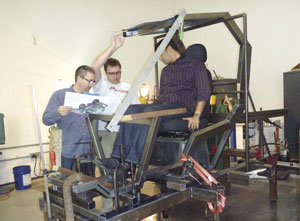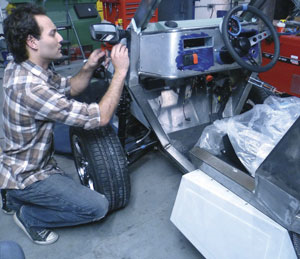Click here to register!
Hybrid Vehicles with Exportable Power for Community-Based Agriculture Mechanization
Overview
|
Innovator |
| |
|
Project |
Hybrid Vehicles with Exportable Power for Community-Based Agriculture Mechanization | |
|
Collaborators |
The KVK Foundation (India) | |
|
Location Applied |
India (West Godavari, Andhra Pradesh) |
Although farm productivity in India has grown steadily over recent decades, crop yields are still just 30 - 60% of the best crop yields in many other countries. Agricultural productivity could be significantly boosted by creating more accessible agricultural machinery, and by providing a mobile energy source that runs on inexpensive renewables to meet multiple farm needs such as harvesting, cold storage, and transportation.[1]
Clean Energy Solution
Motivo is developing a “Swiss-Army Knife” system - the Hybrid Agriculture/Road Vehicles with Electricity Storage and Transformation (HARVEST) - that solves a wide range of agricultural mechanization and power-related problems. HARVEST is a multi-purpose platform that provides power for plowing, well-drilling, cold storage, and transporting crops to market. The system utilizes power from varied energy sources such as solar panels, wind turbines, micro-hydro turbines, or the grid to enable increased productivity all along the agriculture value chain. The entire system is operated at the community level, and facilitated by mobile communication technology for scheduling, billing, and payments.[1]
The HARVEST system was recently featured in the Los Angeles CleanTech Global Showcase and Motivo itself was nominated as having one of the top 5 innovative idewas featured at a tech-conference: read more in the Powering Agriculture April 2016 Newsletter.
Impact
HARVEST democratizes opportunity in agriculture by making available to entire communities huge gains in productivity that are enabled through mechanization and reliable power. Varied energy sources will reduce reliance on increasingly-expensive imported diesel, and the system itself will create new skilled jobs for men and women in rural areas in deploying, managing, and maintaining the HARVEST equipment.[1]
Organization
Motivo Engineering specializes in electro-mechanical systems to solve complex challenges across diverse market segments. Motivo’s partner, the KVK Foundation, will draw on their extensive rural development experience in India to introduce new technologies to rural villages, while its partner Feuerlabs will offer their expertise in remote data connectivity to develop a management platform for new technologies.[1]
Progress Update
By the end of the Powering Agriculture award in May 2017, Motivo Engineering had shipped, assembled, and field tested two HARVEST prototypes in India. The primary use of the HARVEST during field testing was for field leveling, with the systems also being used for hauling and to power lighting for village gatherings. During the initial testing, Motivo learned that HARVEST can accept solar power, but the solar array originally installed was not large enough to effectively recharge the tractor. Based on this information, they tripled the solar array to decrease charging time and re-assess the feasibility of solar charging of HARVEST.
Motivo’s beneficiaries primarily see the HARVEST as a mechanism to reduce expenses on light duty field preparation. Beneficiaries reported that they experience a reduction in crop production expenses resulting in savings that are either used for additional crop production or paying for general household expenses including food and child education. Future plans may include a larger-scale pilot test using up to 50 units. One of the lessons learned was that the expectation of HARVEST to fully replace diesel tractors had not considered all the nuances of specific agricultural tasks. Motivo found that the HARVEST was more appropriate for lighter-duty tasks.
[1]
Further Information
- India Energy Situation
- Hybrid Systems
- Powering Agriculture Homepage - Winners/ Innovators
- Motivo Engineering Homepage
- Powering Agriculture Newsletters






















